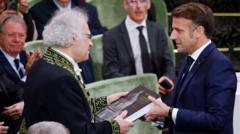In a significant cultural event, the ninth edition of the Dictionnaire de l’Académie Française has finally made its debut, 40 years after work began and almost four centuries since its inception. The formal presentation took place today in the historic 17th-century Collège des Quatre-Nations, where the French Academy, comprised of 40 esteemed members known as the immortels, have traditionally curated the language's evolution since Cardinal Richelieu established the institution in 1635.
The arduous journey to this edition has been marked by inefficiencies and slowness, prompting skepticism about its contemporary relevance. The first dictionary was completed in 1694, and despite numerous advances in language, completing the latest edition took time—the last section, spanning from R to Z, is now complete. Critics, including a group of linguists, have expressed that while the effort is commendable, it has become increasingly irrational due to its excessive delays.
The newly finalized dictionary claims to provide a “mirror of an epoch” from the 1950s to today and includes a staggering 21,000 new entries. However, many of the additions seem to already be out of date. Words like “tiktokeur,” “vlog,” “smartphone,” and “émoji” are absent despite their common usage in modern vernacular. In contrast, newer entries incorporate terms like “soda,” “sauna,” and “supérette,” which fail to capture the urgency of language evolution.
Additionally, the latest edition addresses the feminization of job titles, with female alternatives for positions like “ambassadeur” and “professeur.” However, earlier printed sections haven’t reflected this shift due to the Académie’s historic resistance to such changes. Furthermore, a definition of marriage found in the third section aligns outdatedly with “a union between a man and a woman,” despite contemporary societal adjustments in France.
Such discrepancies highlight a larger issue; critics argue that the dictionary cannot serve as a reliable reference when compared to dynamic online alternatives. Under the direction of president Amin Maalouf, the committee convenes weekly to discuss and deliberate on new definitions prepared by outside experts.
Despite requests from members like poet Michael Edwards for the revival of meaningful yet overlooked words such as “improfond” (undeep), the slow-moving process continues. As discussions for the tenth edition begin, questions remain about how the Académie can best catch up with the fast-paced development of the French language.



















